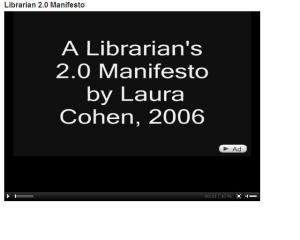I presented the featured address at the School Library Association of Victoria‘s (SLAV) ‘Creating collaborative learning spaces: Future school library scenarios’ conference held at Victoria University of Technology on Friday in Melbourne.
The future of school libraries has been a hot topic these past couple of years in Australia as a result of the Building the Education Revolution (BER) fund, a range of online forums and conferences exploring the vision for 21st century school libraries, followed by the national Inquiry into Australian school libraries and teacher librarians (we hope to see the outcomes of this in early May when the report is tabled at Parliament).
These have all been significant ‘blips’ on the teacher librarianship profession’s radar, and it has resulted in much discussion at the local community, regional and education sector levels, as well as the Australian general public due to increased media exposure across radio and press outlets. Check out the Links section on this blog for examples of these.
This address explored some of the issues, concerns and potentials of school library futures in the past couple of years and examined how a TL’s own practice can contribute to building capacity for a sustainable future where school libraries become key learning centres of information, inquiry, innovation, immersion and instructional excellence. I introduced the concept of the iCentre and the ways schools can develop such a centre based on the principles of form, function and brand. This is based on the Commentary I wrote for ASLA’s journal Access.
I think the three principles of form, function and brand provide a useful framework for schools wishing to explore the convergence of facilities, resources, people, funding, policy, programs and services to develop an iCentre. TLs as information, technology and learning specialists can play a leadership role in building their school’s vision towards an iCentre approach.
I presented the iCentre model as one future school library scenario that could be considered by schools, and suggested that the form-function-brand framework can be useful in exploring what a school library might look like in the future.
Some useful references on future school library scenarios and the iCentre approach include:
Hay, L., & Todd, R. (2010). School libraries 21C: School library futures project. Report for New South Wales Department of Education & Training, Curriculum K–12 Directorate, School Libraries & Information Literacy Unit. Sydney: Curriculum K–12 Directorate, NSWDET.
Hay, L. (2010). Chapter 9: Developing an information paradigm approach to build and support the home-school nexus. In M. Lee & G. Finger (Eds.), Developing a networked school community: A guide to realising the vision (pp. 143-158). Camberwell, Vic.: ACER Press.
Lee, M. & Hay, L. (in press). Teacher librarians and the networked school community: The opportunities. Connections, Issue No. 77, Term 2.
Hay, L., & Todd, R. (2010). School libraries 21C: The conversation begins. [Refereed]. Scan, 29(1), 30-42.
Hay, L. (2010). Shift happens. It’s time to rethink, rebuild and rebrand. [Commentary]. Access, 24(4), 5-10.
I’d really like to hear from any schools already planning for or implementing the iCentre approach. We need to start documenting some school experiences as case studies in 2011.






